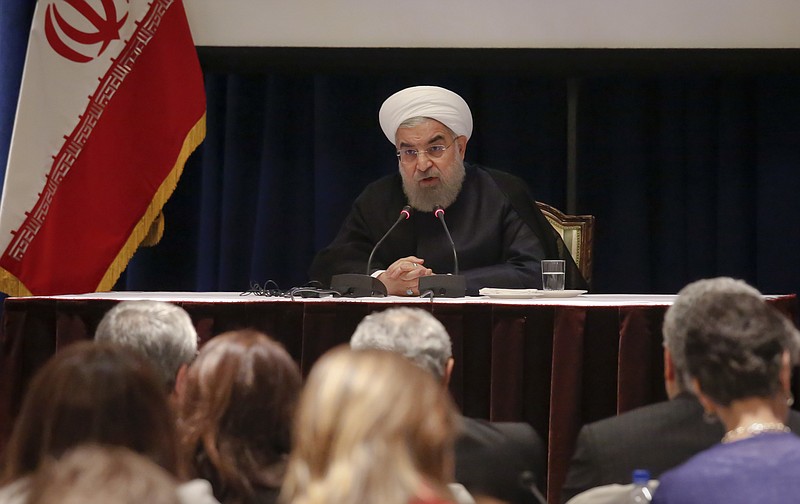UNITED NATIONS (AP) - Iranian President Hassan Rouhani on Thursday joined in opposing a call by U.S. Secretary of State John Kerry to halt all flights over Syria in efforts to get relief shipments through, saying that would only help Islamic radicals gain ground.
Rouhani also alleged Washington was sowing fear among financial institutions wanting to do business with his country as part of the sanctions relief due Tehran under a deal with six powers in exchange for curbs on its nuclear program.
He spoke on the sidelines of the U.N. General Assembly a day after the U.S. government gave aviation giants Airbus and Boeing Co. the go-ahead to sell aircraft to Iran as part of the landmark deals under the nuclear pact potentially worth some $50 billion.
The outgoing administration of President Barack Obama is keen to show that it is honoring the economic terms of the nuclear pact. But Rouhani said permission should have been granted months earlier under terms of the nuclear pact and criticized the "severe delay."
Coming during heated Security Council debate Tuesday, Kerry's proposal to halt all flights was met with disagreement both in Moscow and even in Washington. Gen. Joseph Dunford, chairman of the Joint Chiefs of Staff, told Congress any grounding of war planes should exclude American aircraft, and Russia's deputy foreign minister said grounding flights would make matters worse, a view echoed Thursday by Rouhani.
Kerry called for a stop to all flights after an airstrike on a humanitarian aid convoy this week that killed 20 civilians. But Rouhani suggested air strikes remain the best way of attack on Islamic radicals.
"If you ground flights," he said, "you are aiding the terrorists whether you like it or not because the terrorists ... are well equipped except for an air force."
Iran strongly backs Assad's government and Rouhani said the first priority now should be getting aid to those in need. The second must be a continued focus "on the fight against terrorism," and the third should be "to pave the proper path" to elections including all groups and political parties in Syria, he said
Iran complains that international financial sanctions are not being lifted quickly enough under the agreement that stipulates a removal of these and other penalties imposed over Tehran's nuclear program in exchange for Tehran's agreement to curb atomic activities that could be used to make a bomb. Tehran says America is to blame, a theme Rouhani sounded both in an earlier speech to the General Assembly and in his comments to reporters.
While U.S. financial institutions remain under tight restrictions as part of non-nuclear related sanctions, Rouhani said that other banks complain about confusing signals from the U.S. Treasury Department that create a "lot of doubt" about the legality of doing business with Tehran.
"As one thing they tell them 'you are free to engage with Iran in banking activity,'" he said. "At other times, they ... enter the arena with threats.
"They frighten the big banks," he said.
He said restrictions on U.S. companies doing business in Iran as part of sanctions that remain in place outside the nuclear deal were America's problem. For Tehran's part, said Rouhani, "we have no issues for traders, technicians business owners, company representatives to come to Iran."
Addressing a series of recent encounters between Iranian and American forces raising tensions in and around the Persian Gulf, Rouhani denied that his country's military was to blame, while questioning the need for the U.S. naval build up in the Persian Gulf.
"Our armed forces don't have a mission to be adventurous," he said. "Their only mission is to defend their territorial borders."
On U.S. elections, Rouhani said it's not important who wins but whether the winner is willing "to respect the rights and dignities of nations," especially Iran.
Generally moderate in tone, his comments to reporters were in contrast to his speech which pulled few punches.
Alluding to Washington, he placed the blame for the spread of extremism on the responses by "great powers" to the Sept. 11 attacks. Rouhani said these led to a more insecure world by "advancing different methods of repression and military intervention under the pretext of creating a secure environment for their citizens."
He also was critical of a U.S. Supreme Court ruling this year allowing families of victims of bombing attacks that Washington says were linked to Iran to allow monetary damages from that country. At risk for Tehran is $1.75 billion in bonds, plus accumulating interest.
But he was most tough on Saudi Arabia. Bitter rivals, Sunni Saudi Arabia and Shiite Iran are on different sides in the Syrian conflict as well as fighting proxy wars in Yemen where Houthi rebels are battling government forces. Traditional tensions have been exacerbated by last year's crush and stampede during the annual pilgrimage to Sunni holy sites. Thousands of Iranian pilgrims died and Tehran says poor organization of the event by the desert kingdom is to blame.
Rouhani urged the Saudis to "compensate for past mistakes." Riyadh, he said, "must cease and desist from divisive policies, spread of hate ideology and trampling upon the rights of neighbors," while accepting "responsibility for the protection of the lives and dignity of pilgrims. "
___
Associated Press writer Edith Lederer contributed to this report.
